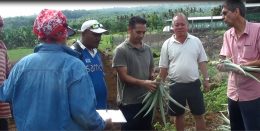Samoa – Farmer-to-farmer learning exchanges are not a new concept and many of them have been run over the five years of the MTCP2 programme. Running a large number of these exchanges, across seven countries and a variety of crops has allowed refinement of the farmer-to-farmer exchange model so that they now work better for farmers and farmer organisations in the Pacific.

In Samoa, there have been a variety of farmer-to-farmer technical exchanges during the programme. These have included off-season pineapple production, papaya production, soil management, floriculture, dragon fruit, and agro-processing. The Samoa Farmers Association has, therefore, had plenty of opportunities to make their own refinements to the model.
One of their key findings is the importance of the careful selection of participants in initial farmer-to-farmer exchanges. The aim at first should not be to train a large number of farmers, but rather should be to establish a small number of local champion farmers, who can implement what they learn on their own farms, apply the technology and build their own expertise. Follow up exchanges are important for reinforcement of the initial training and to provide additional knowledge and skills.
Once the local champion farmer is successfully producing their own crops, they can start to train other local farmers. Using the skills they have learned plus their own local farming experience, makes the knowledge transfer to other farmers easier. Their farm provides a visible, working example to other farmers, while the champion farmer is on hand to mentor them as they make the changes to new crops, or to new production methods. #
About MTCP2
The Medium-Term Cooperation Program Phase 2 (MTCP2), a five-year capacity building program supported by the International Fund for Agricultural Development (IFAD), the Swiss Agency for Development and Cooperation (SDC), and the European Union (EU), has been implemented in 19 countries across three sub-regions—Southeast Asia, South Asia, and the Pacific—engaging 1,544 sub-national farmers organizations (FOs) with a total membership of around 22 million farmers. The funding support (total budget of $ 5 million for the whole duration of the project across 19 countries) serves as a catalytic fund that will allow FOs to enhance their capacity to be effective channels of economic services to farmers. The program has contributed to the formation of the strong national platform of FOs with improved capacity to engage in policy processes and mobilize resources from mainstream agricultural development programs like extension services, credit, and pre and post-harvest facilities. The program also helped in transforming farmers’ associations into commodity-based cooperatives to strengthen the role of small-scale farmers within an inclusive and sustainable value-chain. The program is being implemented by the consortium Asian Farmers’ Association for Sustainable Rural Development (AFA) and La Via Campesina (LVC).

Comments are closed